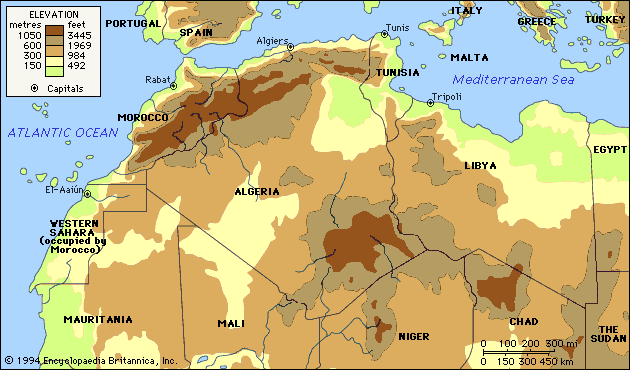North Africa is a culturally rich and geographically diverse region located in the northern part of the African continent. It is known for its unique history, culture, and geography. Here’s an overview of About Geography of North Africa नार्थ अफ्रीका का इतिहास

Geography:
Location: North Africa is the northernmost region of the African continent, and it encompasses the countries that border the Mediterranean Sea to the north and the vast Sahara Desert to the south. Deserts: A significant portion of North Africa is covered by the Sahara Desert, one of the world’s largest hot deserts, characterized by its arid and extreme climatic conditions. Mediterranean Coast: The region’s northern coast along the Mediterranean Sea is more temperate and has a Mediterranean climate, with fertile plains and coastal cities.
Countries:
North Africa includes several countries, each with its unique history, culture, and political landscape. Some of the key countries in the region are Algeria, Egypt, Libya, Morocco, Sudan, and Tunisia.
Historical and Cultural Significance:
North Africa has a rich history that includes the ancient civilizations of Egypt and Carthage. The region is home to many historical and archaeological sites, including the pyramids of Giza, the Roman ruins of Carthage, and the ancient city of Alexandria. The Arab, Berber, and Tuareg cultures have played a significant role in shaping the identity of North Africa, with diverse languages, traditions, and customs. The region is known for its unique music, art, and literature, which have influenced the broader Arab and African cultural landscape.
Languages:
Arabic is the most widely spoken language in North Africa, and the majority of the population is Arab-speaking. In some areas, Berber languages are also spoken. French is often used in education, business, and government in former French colonies like Algeria and Tunisia.
Religion:
Islam is the dominant religion in North Africa, with the majority of the population adhering to Sunni Islam. Sufism, a mystical form of Islam, is also prevalent in the region.
Economy:
The economy of North Africa is diverse, with sectors like agriculture, tourism, and industry playing significant roles. Tourism is an essential source of revenue due to the region’s historical and cultural attractions. The extraction and export of oil and natural gas are crucial to the economies of countries like Algeria and Libya.
Political Challenges:
The region has faced political challenges and instability in recent years, including the Arab Spring uprisings, which led to changes in leadership and political reforms in several countries.
Conflict and Migration:
Some parts of North Africa, such as Libya and Sudan, have experienced civil conflicts and humanitarian crises. These conflicts have contributed to migration issues, with people seeking refuge in Europe. North Africa is a region of great historical significance, with a unique blend of cultures, languages, and landscapes. Its historical treasures, cultural heritage, and geopolitical importance make it a fascinating and complex part of the African continent.
About Geography of North Africa नार्थ अफ्रीका का इतिहास North Africa in hindi North Africa related information North Africa in hindi North Africa related information

